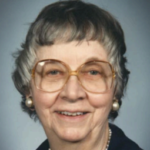Inducted 2025

Dorothy Misener Jurney
editor, Detroit Free Press
Dorothy Misener Jurney was known as “the godmother of women’s sections.” As editor of the Detroit Free Press’ “For And About Women’s” pages between 1959 and 1973, she broadened the content Free Press readers were accustomed to. Women’s pages were known for the four F-s— Food, Fashion, Furnishing and Family. She ran stories outside the norm—such as pieces about women in the workplace, women in politics, and hard-charging reporting on education and sexuality. Newspapers across the country noticed and followed her lead.
The daughter of an Indiana newspaperman and graduate of Northwestern University, she worked as the acting city editor at the Washington Daily News during World War II. She lost her job when the men returned and ended up in the women’s section of The Miami News. She fell into the Knight Newspaper orbit after a telephone call from Lee Hills, a top editor at the Miami Herald, and her competitor. As she later recalled the conversation, Hills asked: “”Could you take on the women’s editorship so that we could get something in the paper that is worth reading?”
Hills became executive editor of both the Free Press and Herald simultaneously during the 1950s, and 1960s, brought Jurney to Detroit—with the same request.
Her creativity shone, even when working well-trodden territory. She hired fashion writer Marji Kunz in 1964. Kunz was a Wayne State University graduate who had worked at fashion magazines in New York. Kunz’s way of doing business: When called upon to attend a fashion event, she attended in a nightgown. Helen Fogel, one of her reporters, recalled: ““We always did stories on women in politics because it didn’t seem to me that a woman who was campaigning for state representative or for the city commission got a fair shake from the news side. So, we just said, we will also do a story on her.” Here’s how she remembered Detroit: “Detroit was a macho city, but there were many strong women too. It was good to identify with their goals – women in the labor movement, women in politics, women in business, women in the arts, and women in Detroit’s great universities and colleges. They were black, Jewish, WASPs and from the many ethnic groups that comprise Detroit. We were reporting on the cutting edge of what was happening, of what people were thinking about, and what people wanted to happen.”
Hills and John S. Knight, owner of the Free Press, shifted her to the Philadelphia Inquirer in 1973. The newspaper was a mess, and she was tasked with trying to turn the newspaper around. She admitted later that her luck had run out. She retired in 1975 and died in 2002 at the age of 93.
